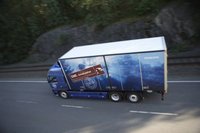Volvo to run field tests for DME–fuelled trucks
 Fourteen trucks fuelled by Dimethylether (DME) will hit the highways of Sweden between late 2009 – early 2010 as part of a project owned by Volvo Powertrain and funded by the Swedish Energy Agency and the European 7th framework programme.
Fourteen trucks fuelled by Dimethylether (DME) will hit the highways of Sweden between late 2009 – early 2010 as part of a project owned by Volvo Powertrain and funded by the Swedish Energy Agency and the European 7th framework programme.The field tests, which involve co-operation between Volvo companies Volvo Powertrain, 3P and Volvo Technology, will see the vehicles leased out to trucking companies to be put through their paces under normal operating conditions.
The tests are part of a wider € 28.5m (£ 22.67m) European project which covers the entire technology chain from biomass to fuel and also includes distribution and fuel stations for DME, a fuel produced through the gasification of biomass or raw fossil materials. The gas that is formed, synthesis gas, is then catalysed to produce DME.
“Each of the 14 engines will be rebuilt at Volvo Powertrain in Malmö, Sweden and tested there before we put them into the trucks in Gothenburg to run under normal conditions,” says Per Salomonsson of Volvo Powertrain, who is leading the project.
As a relatively new fuel, DME presents a number of challenges which will be monitored during the field tests. “It has poor lubricity and we have to work with quality assurance,” says Salomonsson. “We must also adapt to a fuel that handles like LPG, meaning a liquid fuel in a pressure tank at around 5 bar.”
The field tests will take place in Gothenburg, Stockholm, Piteå and Växjö in Sweden and are planned to continue until early 2012.
Powertrain’s facility in Malmö, which has previously done development work on natural gas and LPG engines, has been chosen to test the 13-litre DME engines, which are the third generation of DME technology.
“Today we have both 9-litre and 13-litre prototype engines for DME,” says Gert Persson, project manager for the local testing being done at Malmö. “We are presently testing the new fuel system for the 13-litre engine.”
Lars Sundin, general manager for Volvo Powertrain Malmö, adds: “In the plans we are currently making we will continue to do the application work on the engine in the test cell and it is also in the plan that we will rebuild the engine from diesel to DME here in Malmö. We will do as much as we can in the lab while the final adjustments for drivability need to be done in the vehicle. It is another fuel, another fuel injection system and another storage system, but for the driver it should not be any different.”
Volvo has been involved with extensive tests of alternative fuels and DME is one of those believed to have the best potential, with high energy efficiency, low emissions and relatively low costs.
Indeed, the second-generation 9-litre engine got worldwide attention last year as part of Volvo’s ‘seven trucks powered by seven different alternative fuels’ CO2-neutral demonstration in Stockholm, Brussels and Washington DC.

